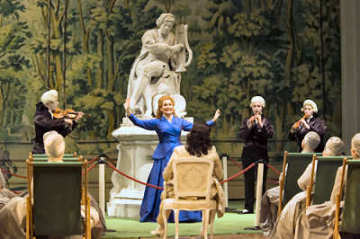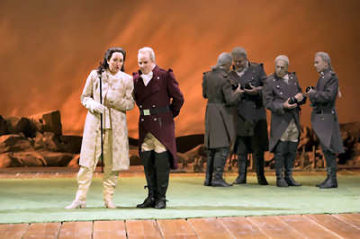George
Frederick Handel, Xerxes:
soloists, English National Opera orchestra and chorus/Noel
Davies, London Coliseum, 19.11.2005 (ED)
Xerxes:Katarina
Karnéus (mezzo)
Arsamenes:
Lawrence Zazzo (counter-tenor)
Amastris:
Lucy
Schaufer (mezzo)
Romilda:
Janis Kelly (soprano)
Ariodates:
Neal Davies (bass)
Atalanta:
Sarah Tynan (soprano)
Elviro:
Graeme Danby (bass)
Conductor:
Noel Davies
Director:
Nicholas Hytner
Revival
Director: Michael
Walling
Designer:
David Fielding
Lighting
Designer: Paul Pyant
Translation :Nicholas
Hytner

How time flies! It hardly seems like twenty years since
I saw this production on its first outing with the original
cast of Ann Murray, Lesley Garrett, Jean Rigby, Christopher
Robson to name a few. For those wanting a trip down memory
lane that cast can be found on
DVD,
captured during the first revival in 1988.
Whilst
some things survive best in the memory, others can bear
often revival and revisiting – such as this production of
Xerxes. As far
back as 1785 Burney criticised the work, citing the “mixture
of tragic-comedy and buffoonery in it”. To my mind it is
these elements that Nicholas Hytner’s
production best succeeds in bringing out through subtle
touches to enliven what could otherwise be a longish evening.
Hytner rightly takes his cue
from Handel, whilst never overplaying his hand to detract
from the wit that the music itself contains. It is a work
that for many shoots its best bolt at the very start with
the famous “Ombra mai
fu” – in praise of the tree – which no doubt spurred on
Hytner’s wish for an airy, green
and lively production.
One of the curiosities
of the score is that Handel borrowed heavily from two earlier
settings of the plot, particularly that of
Bononcini, but the results he achieved through this
often sparkle for a time with a life of their own – even
if they do not stick in the mind as readily as the larghetto.
Noel Davies, conducting the edition of the score he edited
with Sir Charles Mackerras, remained undeterred by this
and kept pace and interest moving steadily throughout the
evening with a lightness of touch.

A
challenge for any company staging the work is to find seven
equally matched soloists with sufficient vocal and acting
abilities to bring the drama to life in all its aspects
– commanding, heroic, passionate, vengeful, scheming, coy
and witty. This maybe explains why Handel did not revive
the work following its premiere. This cast,
to my ears, is almost as strong as the original – and they
have the strength to bring their own insights and interpretations
to the roles too.
In her role debut as Xerxes, Katarina Karnéus might not
have all of Ann Murray’s steel tempered tone, making her
outbursts strong yet less declaimed than they might be,
but she did bring a suitable imperiousness to the role.
Handel’s complex vocal writing and ornamentations flow with
easy assuredness, and when combined with acting of subtlety,
as here, the character shows many of its requisite aspects.
Janis Kelly’s Romilda too was strongly portrayed though
she was obviously more at ease in the romantic aspects of
the role that the more outwardly protesting ones, when she
is forced to fight Xerxes’ will. Vocally there were occasional
moments of slight unevenness, but these could be taken as
part of the anguished characterisation rather than overly
detracting from the experience. Sarah Tynan experienced
no such issues as Atalanta to give yet another assured performance
this season – indeed the contrast of her light soprano served
to highlight Handel’s facility in blending vocal tones and
weights at key moments. Her acting too projected a knowing
intelligence behind the appearance of innocence that aptly
embodied Atalanta’s scheming.
Lucy Schaufer’s Amastris, the disguised princess to whom
Xerxes is betrothed on hand to observe the King’s dalliances
with Romilda before finally revealing her true identity,
played the part well to thwart her beloved’s plans. Neal
Davies as Romilda’s father has the smallest of the roles,
yet crucially seals the match between his daughter and the
King’s brother Arsamenes – and it is well taken.
Stronger by far is Lawrence Zazzo as Arsamenes, mind you
he has more material to work with in a character that is
at once obsessed by love and anger to prevent Xerxes’ designs
towards Romilda. All of this was present in skilful acting
and, for once, a truly manly counter-tenor tone – flexible
and excellently projected to deliver a probing interpretation
of Hytner’s English text. Graeme Danby rightly contrasted
in tone and character as the servant Elviro to explore the
comic possibilities that Handel allows for.
Xerxes for ENO
remains an evergreen in good health that appears almost
as fresh as it did long ago. No doubt it will be a central
plank in their repertoire for years yet – and when as strongly
cast as this, why not?
Evan Dickerson
IMAGES ARE COPYRIGHT ENGLISH NATIONAL OPERA AND CLIVE BARDA




